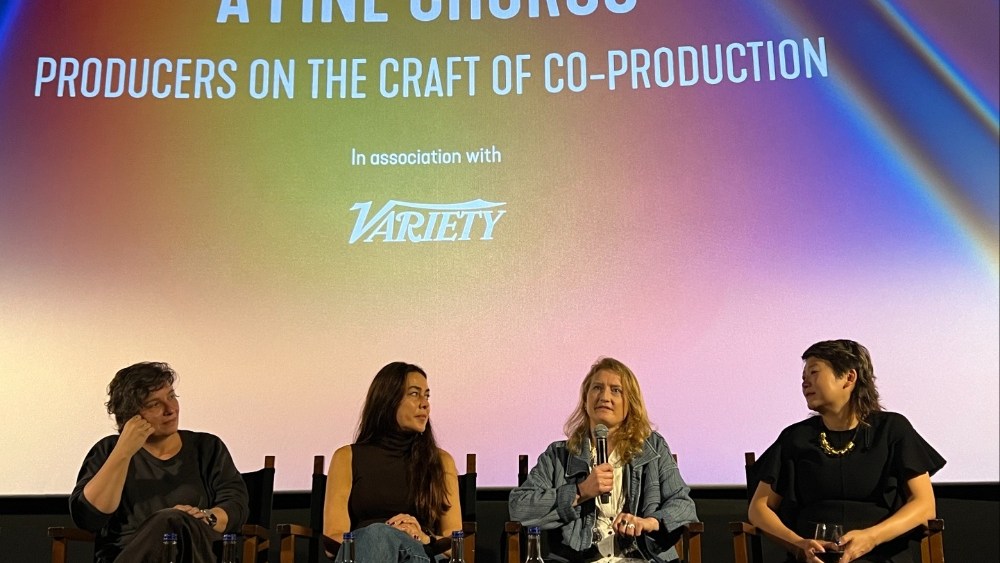The UK’s film tax credit system is a major attraction for international co-productions, helping to shake off the UK’s reputation for difficult legal systems and complex funding requirements, according to a panel of leading producers at the BFI London Film Festival.
“There are so many opportunities in the UK,” said Claudia Simieja-Rostołowska, a Polish producer at Madanz Films, noting that the UK’s tax credits are “unusual” and are helping European filmmakers understand how to structure bigger films while maintaining cultural proximity. “There is really value in working with the UK first before jumping into the larger US market.”
“When you dream of Hollywood, the first place you go is England,” added Szmieja-Rostołowska. “Everyone has this dream, no matter how much they try to avoid it. Yes, everyone wants to go because there seems to be a lot of money. Everyone wants to get their films distributed in America, and it’s very natural that we want that.”
The praise for the UK incentive came during a discussion on international co-productions at the festival’s industry forum, which included producers behind several festival titles, including Sentimental Value, Orphan, Dreamers and Diamond in the Sand.
Emily Morgan of London-based Quiddity Films highlighted the attractiveness of UK funding sources, particularly for minority co-producers. “I think the funding sources coming here these days are attractive and the staff are good,” she says, although she concedes that “there’s no denying that the laws are tough.”
Morgan, whose credits include ‘The Settlers’ and ‘I’m Not a Witch’, has just completed production on ‘The Wolf Will Tear Your Immaculate Hands’ in Belfast and is bringing the Swedish, Icelandic and Belgian production to Northern Ireland. The UK part accounted for 30% of the funding, leveraging national tax credits along with support from the BFI’s Global Screen Fund and Northern Ireland Screen.
The Global Screen Fund was established to replace Creative Europe funding after Brexit and has proven particularly valuable for UK producers seeking to take part in international projects. “When Brexit happened, I was about to move to Amsterdam to become a European producer,” Morgan revealed. “But then Global Screen Fund… started making my co-production dream come true.”
The panel highlighted the complex realities of assembling international co-productions, with producers explaining structures ranging from two to as many as nine countries on a single film.
Maria Ekelhofd of Norway’s Mar Film spoke at length about the financing of director Joachim Trier’s (The Worst Man in the World) Sentimental Value, which brought together five countries. Norway accounted for 60% of the budget, France 20% and Sweden, Denmark and Germany the rest. Importantly, around 70% comes from soft money (public sources), ensuring creative freedom.
“We started fundraising before we actually had anything,” Ekerhovd explained. The project’s prestigious history allowed producers to strategically decide which partners to invite without having to persuade reluctant investors.
Lorna Tee, producer and secretary general of the Asian Film Alliance Network, described more complex arrangements, such as working on the Cannes title Vietnam and Nam, which required the coordination of nine co-producers. Her film “Diamonds in the Sand,” which is currently participating in film festivals, was co-produced by the Philippines and Japan with 70% Philippine funding and 30% Japanese funding.
Despite the technical complexities, all four producers emphasized that personal connections and trust were more important than contractual frameworks when choosing co-production partners.
“I hate the loneliness of this industry,” said Šmieja Rostołowska, explaining that she prefers horizontal partnership structures where all producers maintain equal creative input, rather than vertical arrangements with a single decision maker. “Choosing a partner, a partner, a physical partner, who will be your colleague for the next five years is very important to me.”
Mr Tee emphasized the importance of informal review. “In Asia, eating together is very important…When you see someone in a relaxed state, you get to know them in a completely different way.”
Producers warned against proceeding with co-productions solely for financial reasons. “I’m not sure it’s such a good idea to convince five or six countries to join,” said Šmieja Rostołowska, noting that the administrative burden and delays in cash flow could outweigh the benefits of additional funding.
The committee gave a frank assessment of the relationship with distributors, describing them as “instruments” but acknowledging tensions in the partnership.
“As a producer, I sometimes feel that it’s very unfair, because both[the sales agent]and the distributor often come late and come back early, and they always make money on the project, and we almost never do that,” Ekerhovd said. However, she admitted that MK2 Films’ early involvement in “Sentimental Value” was crucial in achieving the necessary budget levels through pre-sales and bringing in additional investors.
Mr Tee pointed out the challenges currently facing sales companies and cautioned producers to study how agents treat debut directors. “Some sales agents…are really bad at dealing with first-time debut directors, because they ask for €2,000 in screening fees for each film festival,” she says, adding that this can conflict with producers’ goals of maximizing exposure at film festivals.
Potential U.S. tariffs were briefly mentioned in the discussion, but producers largely dismissed any immediate concerns, with Šmieja Rostołowska noting that the industry had moved on after “a week of panic.”
When asked about her favorite co-production markets, Rotterdam and Berlin were mentioned most often, but Schmieja-Rostołowska praised the London Film Festival’s industry program for allowing for more focused business conversations.
This panel discussion was hosted in collaboration with Variety.

